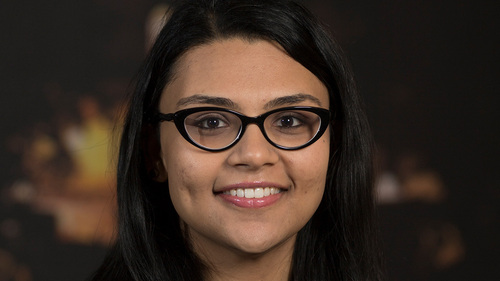
Aastha Nigam, a doctoral student in the Department of Computer Science and Engineering, placed second in the graduate division of the Association for Computing Machinery’s (ACM) Student Research Competition (SRC) held Oct. 4-6 during the recent Grace Hopper Celebration (GHC) in Orlando, Florida.
All participants in the SRC were required to submit an extended abstract in addition to presenting a poster and delivering a 10-minute talk on their subject matter. The title of Nigam’s winning presentation was “Harvesting Social Signals to Inform Peace Processes Implementation and Monitoring.” In her paper, poster and presentation, she showcased how social media can affect not only the delicate back-and-forth of establishing peace between factions but also the final outcome. In addition to the significant bargaining and compromising between political stakeholders, societal needs and wants play a big role in the success of a peace process, making it necessary to measure the pulse of a nation in efforts to remain responsive to citizens’ concerns.

Her presentation used Colombia’s final peace agreement and national referendum as a case study, focusing on two important indicators — inter-group polarization and public sentiment toward the peace process. Using a detailed linguistic analysis of social media and a predictive framework, she and her team were able to demonstrate that had pro-accord stakeholders leveraged public opinion via social media outlets, the outcome of the final referendum could have been different.

For her efforts, Nigam received a silver medal and cash prize. But that’s not all she’s taking from the experience. “GHC is one of the biggest conferences to celebrate women in computing. With approximately 18,000 attendees from academia and industry, it was a great honor to be part of the competition,” she said. “As a participant, it was a wonderful experience to not only present this work at this platform but also obtain direct feedback from experts with diverse backgrounds. Such experiences not only help in growing as a graduate student but also aid in understanding the relevance, applicability and reach of our work.”
Nigam, who expects to complete her degree in 2018, integrates and models diverse nuggets of data to predict user behavior across social channels, building better user profiles and inferring their preferences. She has extensive experience in several labs on campus developing machine learning models to solve real world problems as well as research experiences and internships off campus with the Army Research Laboratory, IBM Research, Image Analysis and Biometrics Lab, Precog, ABB Research and more. Her adviser is Nitesh V. Chawla, the Frank M. Freimann Professor of Computer Science and Engineering, director of the Interdisciplinary Center for Network Science and Applications, and director of the Data Inference Analysis and Learning Lab.
Originally published by at conductorshare.nd.edu on October 12, 2017.